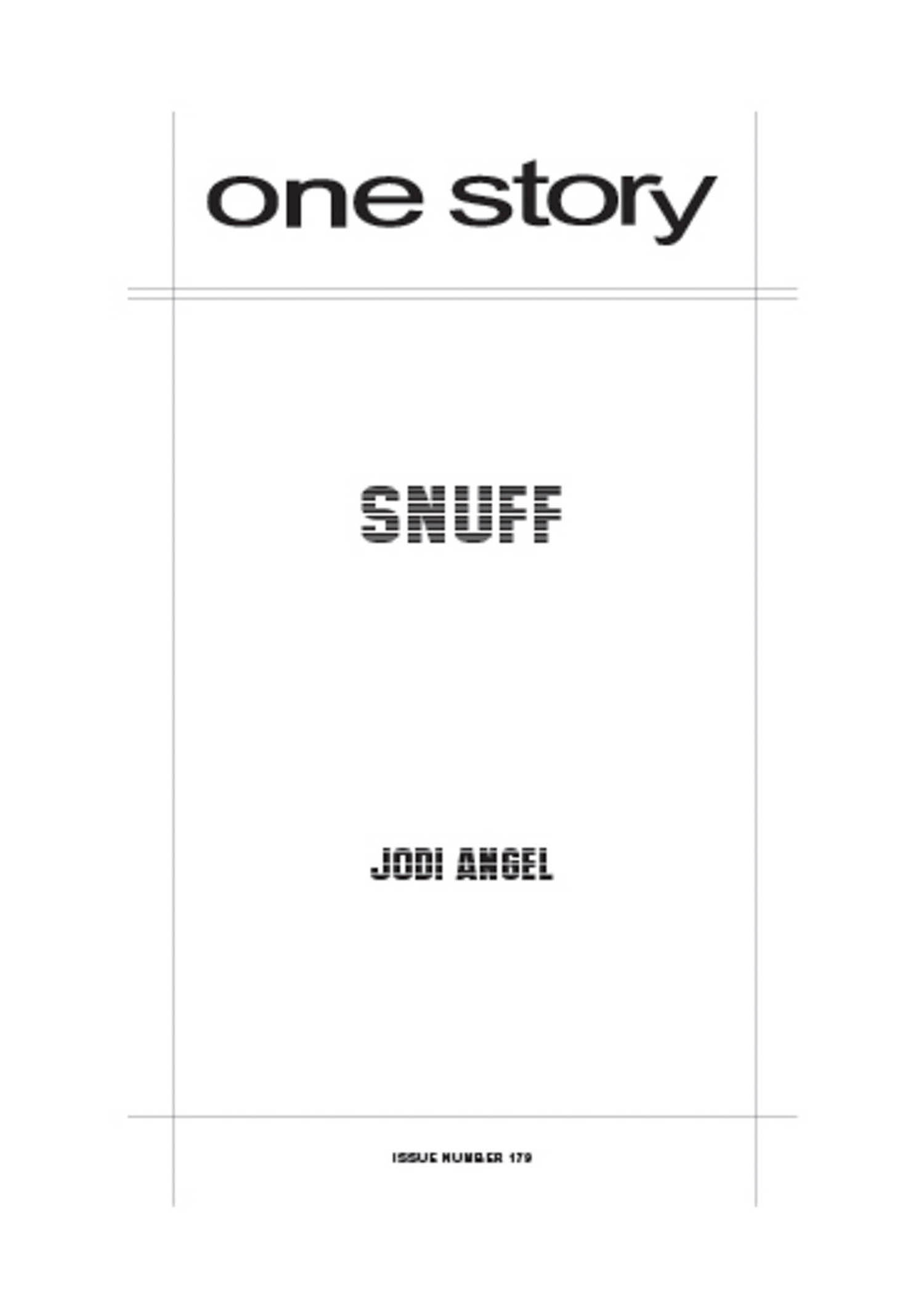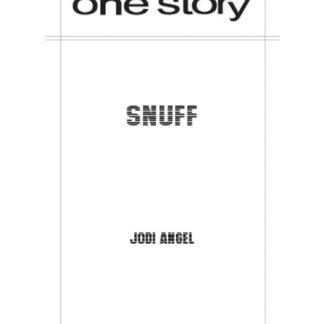
Snuff
$2.50
32 in stock
Excerpt
There was a group of guys I knew from school gathered in a garage out back of Billy’s house, and Billy had hung a bedsheet up on the wall and propped the projector on a milk crate stacked on a folding chair. He told us he’d gotten the movie from somebody’s brother’s best friend’s cousin, and we all stood there and watched the film from start to finish, no credits, no title, no names, no sound. When the last jumpy frames of 8mm finally spun through the reels, everybody started talking at once, and Mike Toth said No fucking way, and Lenny Richter leaned into me and whispered, Nothing but corn syrup and food coloring.
Jodi Angel
Jodi Angel is the author of the forthcoming collection, You Only Get Letters From Jail, from Tin House Books. Her stories have appeared in Esquire, Tin House, Electric Literature’s Recommended Reading, Byliner, and Zoetrope: All-Story, among other publications and anthologies. Her work has been selected as a Distinguished Story in the Best American Short Stories of 2012, and for Special Mention in the Pushcart Prize XXXI. She grew up in a family of girls.
Q&A by Karen Friedman
- KF: Where did the idea for this story come from?
- JA: I wanted to write a story about a snuff film, without actually writing about a snuff film. I have always been fascinated with the urban legends surrounding these kinds of films, and I wanted to write about the experience of what it would be like if you were a teenager watching one, or maybe it wasn’t really one, and how would it distort your perceptions of sex, women, and violence? In Snuff, there is a lot of question as to whether or not the film is real, and this fundamental manipulation of appearances is part of the driving force of the story—what is real vs. what is not real, and how Shane and Charlotte are both attempting to define and understand their respective existences. I also like to set my stories in 1980 or earlier, and I see this story as being set in 1977 (though it isn’t an overt or necessary concept in the story, but I do like to always leave clues about the year), and that was in the wake of the release of the movie Snuff, and I think it inspired the curiosity over the validity of such a film. In the story, Shane’s entire life changes over the course of those few hours on the road, and he will never be the kid he was earlier that evening, standing there at Billy’s house and wondering if what he was watching was real. Shane won’t see the world as innocently as he used to.
- KF: What was the most challenging aspect of writing this story?
- JA: I think that the challenge was in keeping most of the story buried beneath the surface, but keeping a lot going on without very much happening, if that makes sense. I like to write stories that exist within sort of a smothering and constricted set of parameters—very few characters, a short span of time, limited setting. Those stories are also difficult to write because SOMETHING has to be happening and it has to be an intense kind of something that makes the reader want to stay just as locked in to the situation as the characters are. For this particular story, I wanted to keep the relationship between Shane and Charlotte complicated and built more on what isn’t being said between them, rather than what is. I followed Hemingway’s iceberg theory for structuring the short story—where 7/8 exists below the surface, and for Snuff there is probably less than 1/8 breaking above the waves.
- KF: Snuff is part of your collection, You Only Get Letters from Jail, which Tin House Books is publishing in July. How does this story fit into the rest of the collection?
- JA: The entire collection consists of different stories narrated by teenage boys, so Snuff is another teenage boy tale. All of the stories are built on these teenage boys who are caught between childhood and adulthood, and often times they are motivated by boredom and a poorly crafted set of good ideas, and they have limited experiences with love and loss and life and death and sex, and they tend to wander into situations that put them immediately beyond their depth. The stories are about loss, and the manipulation of appearance vs. reality, and lies vs. the truth, and sex and violence, and these thematic elements are very much a part of Snuff.
- KF: Violence and female sexuality seem to get twisted together a lot—not just in the rumored snuff films of the What was the seed of this story? What was the first thing you wrote0s but also in incidents like the recent Steubenville rape case. In a public way, a sector of our society seems to say that it’s erotic or at least an acceptable form of male bonding to degrade and harm a woman. Could you talk about your choice to write about the connection between violence and sex from a male point of view?
- JA: For the boys in Snuff, there is a misperception of what they expect to see in the film, and the distortions begin early on—there is some question as to whether or not the film is real, whether it’s going to be about sex, and what the purpose is of watching it. The other boys are all riding one of those distorted tangents, and when Shane looks around at everyone else, he realizes that he is the only one who seems to be nervous and scared about what he’s watching. In some respects, the story itself is a distortion of a snuff film—the reader has just participated in watching a snuff film, except this violence has been perpetrated on a female deer. There is a voyeuristic quality to the events that night, and to the story itself, and Shane and the readers are the observers. This story is more about sexuality than sex, and Charlotte is well aware of herself, and Shane’s entire experience of sexuality is being built on half-truths and distortions and an awful lot of shame. I think that this is a story about misperceptions and things taken out of context, and while the snuff film is a catalyst, it’s really just another form of misconstrued violence and sex that may or may not even be real—and Shane and Charlotte cannot separate the true from the false.
- KF: In the first draft of this story that I read, Shane’s sex was unclear until almost the very end. I know you play with gender expectations in some of your other stories as well. What is it that draws you to gender as a subject?
- JA: I like gender roles and stereotypes, and trying to write against those stereotypes and the disillusionment of gender expectations. Many of my characters are trying to mitigate the space between who they are and who they are supposed to be, and gender roles is one of those expectations that is thrust on someone in terms of self-definition: this is how you’re supposed to be. All of the characters of my stories like to challenge who they are supposed to be because often times that expectation has been a source of disappointment for the character, or for someone else. In Snuff, Charlotte knows that who she is is a disappointment to her father, and she is trying to do something to fulfill what she thinks are expectations of who she is supposed to be, but in her quest to fulfill those expectations, she has distorted it all.
- KF: Shane and Charlotte’s relationship anchors the story, and one of the aspects that I most love is the way you’ve captured the intensity of their bond, without dismissing the distance between them. How did you land on that very real balance?
- JA: Charlotte is probably the big sister that I always wanted to have, but since I am the oldest in my family, I just had to write the relationship that I would want instead. I think the relationship between the two characters works because on the surface it is very real—there is the push and pull of frustration and love and sibling animosity that exists in any family, but underneath it both Charlotte and Shane live with a controlling and unpredictable father and their only sources of nurturing come from each other—both of them know that. And Shane knows that Charlotte is struggling, and even though he doesn’t want to admit why, he knows that he has to let Charlotte go through with what she wants to do that night—it’s a symbolic birthing process of sorts in more ways than one.
- KF: What are you working on now?
- JA: Right now I am working on a novel about all my favorite things like madness and violence and sex and lies and stealing and death. And teenage boy narrators. Those kids and their stories.
- KF: What is the best bit of advice about writing you have ever received?
- JA: Meteorology matters. A writing tip I once read said that weather is important. Far too often writers get too wrapped up in their characters and they put them in these situations and they have all kinds of dialogue and tension and interaction, but what is forgotten is that outside those windows there is weather, and things happening, and life going on, and every now and then you have to stop and bring in those outside elements because the world is more than just the room your characters are arguing in.
